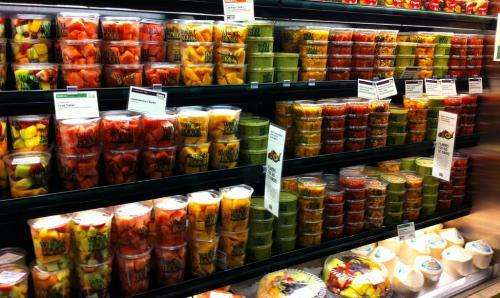Distance to supermarket makes no difference to diet quality, study says

(Medical Xpress)—Public health experts have assumed that living close to a supermarket is linked to a better diet and lower obesity. The closer you lived to one, the theory went, the more likely you were to eat more fruits and vegetables.
But a new study, conducted in Seattle and led by researchers in the University of Washington School of Public Health, finds that distance from a supermarket doesn't matter when it comes to diet quality. What counts most is exactly where a person decides to shop.
"Clearly, people tend to bypass a multitude of supermarkets, grocery and ethnic stores near their homes to get to their primary supermarket of choice," said lead author Anju Aggarwal, a research associate at UW's Center for Obesity Research.
Choices on where people shopped were likely based on individual factors ranging from economic necessity to lifestyle, culture and attitudes about healthy foods, she added.
The American Journal of Public Health published the study March 13.
The study was based on data from nearly 1,400 Seattle-area supermarket shoppers and the 2008-2009 Seattle Obesity Study. Using telephone surveys and King County government records, researchers in the UW Urban Form Lab geocoded locations of all food sources in King County, including respondents' nearest and primary supermarkets. Primary supermarkets of choice were categorized by price (low, medium and high) based on the cost of a basket of 100 goods.
Diet differed according to preferred grocery stores. The researchers also found that shoppers at lower-cost supermarkets ate significantly fewer fruits and vegetables – nearly a serving less per day – than those who shopped at higher-cost supermarkets.
"Fruit and vegetable consumption was higher when people shopped at Whole Foods than when they shopped at a Safeway," said co-author Adam Drewnowski, professor of epidemiology and director of the UW's Center for Public Health Nutrition.
Drewnowski added that the debate over access to healthy foods needs to be shifted from physical proximity to ensuring people in lower-income groups have greater purchasing power. Whether a higher minimum wage would achieve that is one possible question to explore, he said.
More information: Anju Aggarwal, Andrea J. Cook, Junfeng Jiao, Rebecca A. Seguin, Anne Vernez Moudon, Philip M. Hurvitz, and Adam Drewnowski. (2014). "Access to Supermarkets and Fruit and Vegetable Consumption." American Journal of Public Health. e-View Ahead of Print. DOI: 10.2105/AJPH.2013.301763

















